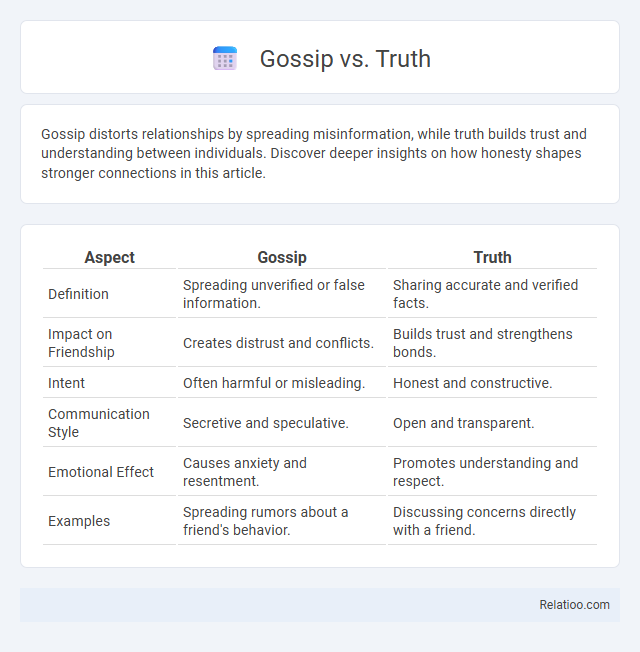Gossip distorts relationships by spreading misinformation, while truth builds trust and understanding between individuals. Discover deeper insights on how honesty shapes stronger connections in this article.
Table of Comparison
| Aspect | Gossip | Truth |
|---|---|---|
| Definition | Spreading unverified or false information. | Sharing accurate and verified facts. |
| Impact on Friendship | Creates distrust and conflicts. | Builds trust and strengthens bonds. |
| Intent | Often harmful or misleading. | Honest and constructive. |
| Communication Style | Secretive and speculative. | Open and transparent. |
| Emotional Effect | Causes anxiety and resentment. | Promotes understanding and respect. |
| Examples | Spreading rumors about a friend's behavior. | Discussing concerns directly with a friend. |
Defining Gossip and Truth
Gossip involves sharing unverified or personal information about others, often fueled by speculation or rumors that may distort reality. Truth is grounded in factual accuracy, verifiable evidence, and objective reality, providing a reliable foundation for informed decisions. Your ability to differentiate gossip from truth enhances communication and fosters trust in personal and professional relationships.
The Origins of Gossip
Gossip originated as an evolutionary tool for social bonding and information exchange, serving to strengthen group cohesion and maintain social order. Anthropological studies reveal that gossip provided early humans with critical insights into reputation and trustworthiness, influencing group survival. Understanding the roots of gossip highlights its dual role in shaping both truth and misinformation within communities.
Why Truth Matters
Truth matters because it builds trust and credibility, essential for healthy relationships and informed decisions. Gossip often distorts facts, creating misunderstandings and damaging reputations, while truth provides clarity and accountability. By seeking truth, you foster respect and genuine communication that supports personal and professional growth.
Gossip’s Impact on Society
Gossip shapes societal dynamics by influencing perceptions, often distorting truth and reinforcing stereotypes. You must recognize how gossip can erode trust and create divisions within communities, impacting relationships and social cohesion. Understanding its power allows you to mitigate negative effects and promote truthful, constructive communication.
Truth in Journalism and Media
Truth in journalism serves as the cornerstone for credible media, ensuring that information is accurate, verified, and free from bias or sensationalism. Your trust in news sources is built when journalists prioritize fact-checking and ethical standards over gossip or rumors. Upholding truth fosters informed communities and strengthens democratic processes by delivering clear, reliable insights.
Psychological Effects of Gossip
Gossip influences your psychological well-being by triggering anxiety and social stress, often distorting the truth and amplifying negative emotions. The truth provides clarity and reduces uncertainty, fostering trust and emotional stability in social interactions. Understanding the psychological effects of gossip helps you navigate social dynamics and maintain mental health by discerning fact from rumor.
Detecting Truth Amidst Gossip
Detecting truth amidst gossip requires critical evaluation of information sources and cross-referencing facts with reliable evidence. You can enhance your judgment by identifying biases, verifying claims with credible data, and distinguishing rumors from verified statements. Employing these strategies reduces misinformation and strengthens your ability to discern accurate information in social conversations.
Social Consequences of Spreading Gossip
Spreading gossip often distorts truth, leading to misunderstandings and damaged reputations that can ripple through social networks. When you participate in gossip, trust diminishes among peers, creating an environment of suspicion and conflict. Promoting factual truth instead strengthens relationships and fosters a culture of respect and transparency.
Tools for Verifying Information
Effective tools for verifying information include fact-checking websites like Snopes, FactCheck.org, and PolitiFact, which analyze claims and provide evidence-based evaluations. Social media platforms are increasingly integrating AI-driven verification tools to flag misinformation and provide users with context or source credibility. Cross-referencing multiple reputable news sources and official documents remains a critical practice to distinguish gossip from verified truth.
Fostering a Culture of Honesty
Fostering a culture of honesty requires distinguishing truth from gossip by promoting transparency and accountability in communication. Encouraging open dialogue and critical thinking helps individuals verify information before sharing, reducing the spread of misinformation. Organizations that prioritize integrity build trust and create environments where factual discussions prevail over harmful rumors.

Infographic: Gossip vs Truth
 relatioo.com
relatioo.com